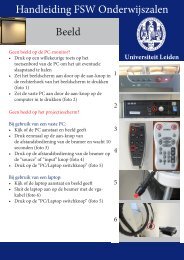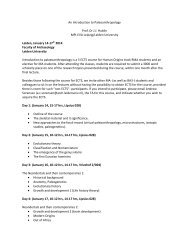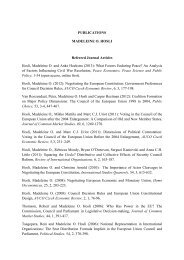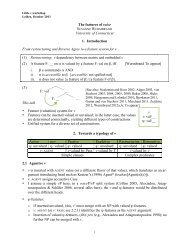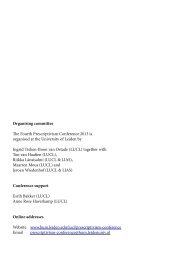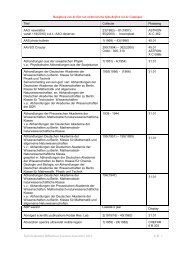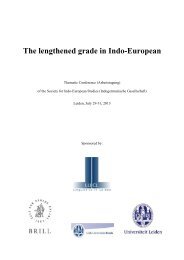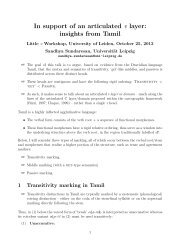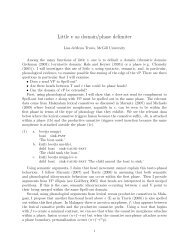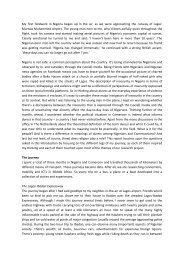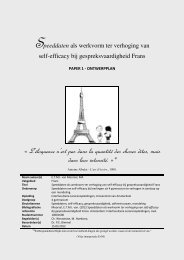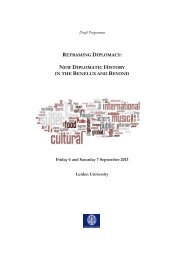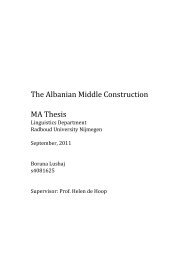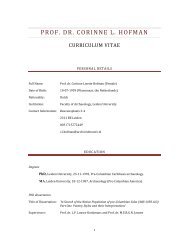LUC The hagUe ProfiLe 1
LUC The hagUe ProfiLe 1
LUC The hagUe ProfiLe 1
Create successful ePaper yourself
Turn your PDF publications into a flip-book with our unique Google optimized e-Paper software.
ART. 3.7 - LEVEL<br />
<strong>The</strong>re are three BA levels at which a course can be offered:<br />
1. introductory (100);<br />
2. intermediate (200);<br />
3. advanced (300).<br />
In specific cases, such as the capstone project and Dean’s masterclass, a graduate<br />
level course (400) may also be offered.<br />
ART. 3.8 - PREREQUISITES<br />
1. In general a 100-level course has no prerequisites, a 200-level course will<br />
have a 100-level as prerequisite, and before a student can start a 300-level<br />
course the appropriate 200-level course should be completed. <strong>The</strong> course<br />
catalogue and prospectus state the specific prerequisites for entry in courses.<br />
2. A student can only start with a course if s/he complies with the prerequisites.<br />
3. A student can be exempted from the prerequisites after written consent from<br />
the course convener and the Examinations Committee. A student can be<br />
asked to complete reading or other work to be granted this exemption.<br />
Paragraph 4 - assessment<br />
ART. 4.1 - GENERAL<br />
1. Part of each course is an examination to determine whether the student has<br />
achieved the educational objectives set for the module in a satisfactory manner.<br />
This includes advice about the student’s participation in the module and<br />
the progress in his or her studies.<br />
2. <strong>The</strong> results of all pieces of assessment will normally be expressed as a whole<br />
or fractional number between 1 and 10, including both limits. <strong>The</strong> results<br />
shall not be expressed as a number between 5 and 6.<br />
3. All items of assessment in a course must be completed and passed before the<br />
end of the course, allowing ten working days after submission for marking.<br />
4. An overall mark of lower than 6.0 is a fail; the student will receive no credits<br />
for the course. In order to pass a course, students must show that they<br />
attempted to meet the requirements of ALL assessment elements as specified<br />
in the syllabus. Assessment elements include, for example, web-postings,<br />
in-class examinations or essays.<br />
5. Because <strong>LUC</strong> employs a system of continuous assessment, there are normally<br />
no resits for failed courses. <strong>The</strong> student can repeat the full course at a later<br />
moment but the failing grade will remain on record. Any credit shortage<br />
should be repaired within two semesters of enrolment.<br />
6. Students are required to take examinations at the time they are scheduled,<br />
except with express prior permission of the Examinations Committee.<br />
7. In special cases, the Examinations Committee can grant extenuating circumstances<br />
for students to take examinations under special conditions or at<br />
different times.<br />
8. <strong>The</strong> outline and syllabus for each course state the type, nature and timing of<br />
all examinations in that course; all courses contain at least three moments<br />
of assessment. No single assessment element can count for more than 40% of<br />
the overall course grade. In order to pass a course, students have to attempt<br />
to meet the requirements of ALL moments of assessment.<br />
9. <strong>The</strong> form and nature of assessment in a course cannot be changed while the<br />
course is running.<br />
10. <strong>The</strong> syllabus for each course specifies grade penalties for late submission<br />
(grade reduction), failure to meet word limits or maximum durations (grade<br />
reduction), plagiarism (fail).<br />
11. On the first occasion, plagiarism, including self-plagiarism, will result in<br />
failing the assignment. In the case of a second instance, the student will<br />
fail the course. Should the Examinations Committee find that the student<br />
plagiarised a third time, it will recommend to the Dean that the student be<br />
excluded from further participation in the degree programme.<br />
12. Each course syllabus will also state the conditions under which an examination<br />
should be taken. During examimations it is not normally allowed to<br />
have mobile telephones or PDA’s (personal digital assistant) of any kind<br />
within reach even if they are turned off. <strong>The</strong> exam will be declared invalid if<br />
students do not comply with this rule. For particular courses a course convener<br />
can authorize the use of specific electronic equipment (for example, a<br />
calculator).<br />
13. Within ten working days after the date of the examination, the examiner<br />
shall mark any written or other test and present the student with a written<br />
notification of the result of the examination. If the examiner is unable to do<br />
this within ten working days, the student shall be notified thereof within<br />
said time limit.<br />
82 aCaDeMiC rULes aND regULaTioNs aCaDeMiC rULes aND regULaTioNs 83



